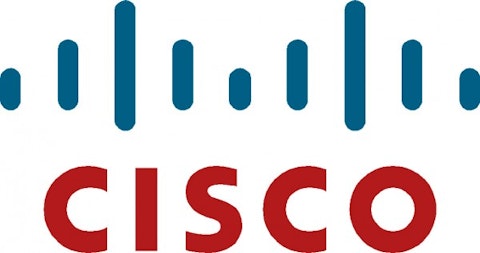As I stated in a previous article, the foundation for modernizing U.S. hospitals and helping new “smart” medical devices flourish is a healthy Wi-Fi network. A recent study from Ponemon Institute found that outdated technology such as pagers, poorly run email systems, BYOD (bring your own device) bans, and the lack of stable Wi-Fi connections cost U.S. hospitals $8.3 billion annually.
These shortcomings are impeding the adoption of useful mobile medical reference apps such as athenahealth‘s Epocrates and popular mobile EHR products such as Allscripts‘ Wand and drchrono. They also make medical tech based on wearable smart devices more of a dream than a viable future.
Therefore, let’s focus on the primary players in enterprise Wi-Fi — Cisco Systems, Inc. (NASDAQ:CSCO), Juniper Networks, Inc. (NYSE:JNPR) , and Hewlett-Packard Company (NYSE:HPQ) — and see how each company intends to improve the connectivity of U.S. hospitals.
Meet the 800-pound gorilla
Cisco Systems, Inc. (NASDAQ:CSCO), the largest networking company in the world, is the dominant company in enterprise Wi-Fi with a market share of 52.9% according to the latest numbers from IDC. Cisco Systems, Inc. (NASDAQ:CSCO) has a strong presence across multiple industries, and it has used a strategy of bundling network products together at a discount to gain market share from smaller rivals.
Even after those discounts, however, Cisco Systems, Inc. (NASDAQ:CSCO) has impressively retained higher margins than its primary competitors.
| Operating Margin (mrq) | Profit Margin (mrq) | |
| Cisco | 23.69% | 20.54% |
| Juniper | 11.64% | 6.74% |
| Aruba Networks, Inc. (NASDAQ:ARUN) | 0.33% | -5.39% |
| Hewlett-Packard | 7.84% | -2.79% |
Source: Yahoo Finance, 9/2/2013.
Smaller competitors such as Aruba Networks, Inc. (NASDAQ:ARUN) have been crushed by Cisco’s strategy. While Cisco Systems, Inc. (NASDAQ:CSCO) can bundle together WLAN and other data center products, such as video security solutions, smaller companies (in terms of market share) like Aruba Networks, Inc. (NASDAQ:ARUN) can only provide standard WLAN products at higher prices.
In healthcare, it’s the same story. Aruba Networks, Inc. (NASDAQ:ARUN) has a suite of mobility options for healthcare practices to increase Wi-Fi connections for clinicians and patients, including robust support for EHR (electronic health record) software.
Cisco has gone several steps further, however, by partnering with tech giant IBM to create an all-in-one digital hospital solution that includes RFID tags for patients, biometrics-activated work terminals, and improved security measures which optimize clinician workflow via integration with EHR software.
As a result of its bundling and strategic collaborations, Cisco Systems, Inc. (NASDAQ:CSCO)’s enterprise Wi-Fi revenue surged 23.4% year-on-year in the first quarter of 2013 while Aruba Networks, Inc. (NASDAQ:ARUN)’s only grew by 8.5%, according to IDC. Hewlett-Packard Company (NYSE:HPQ)’s Wi-Fi enterprise revenue grew 12.4% during that period, giving the company a 5.4% share of the market.





